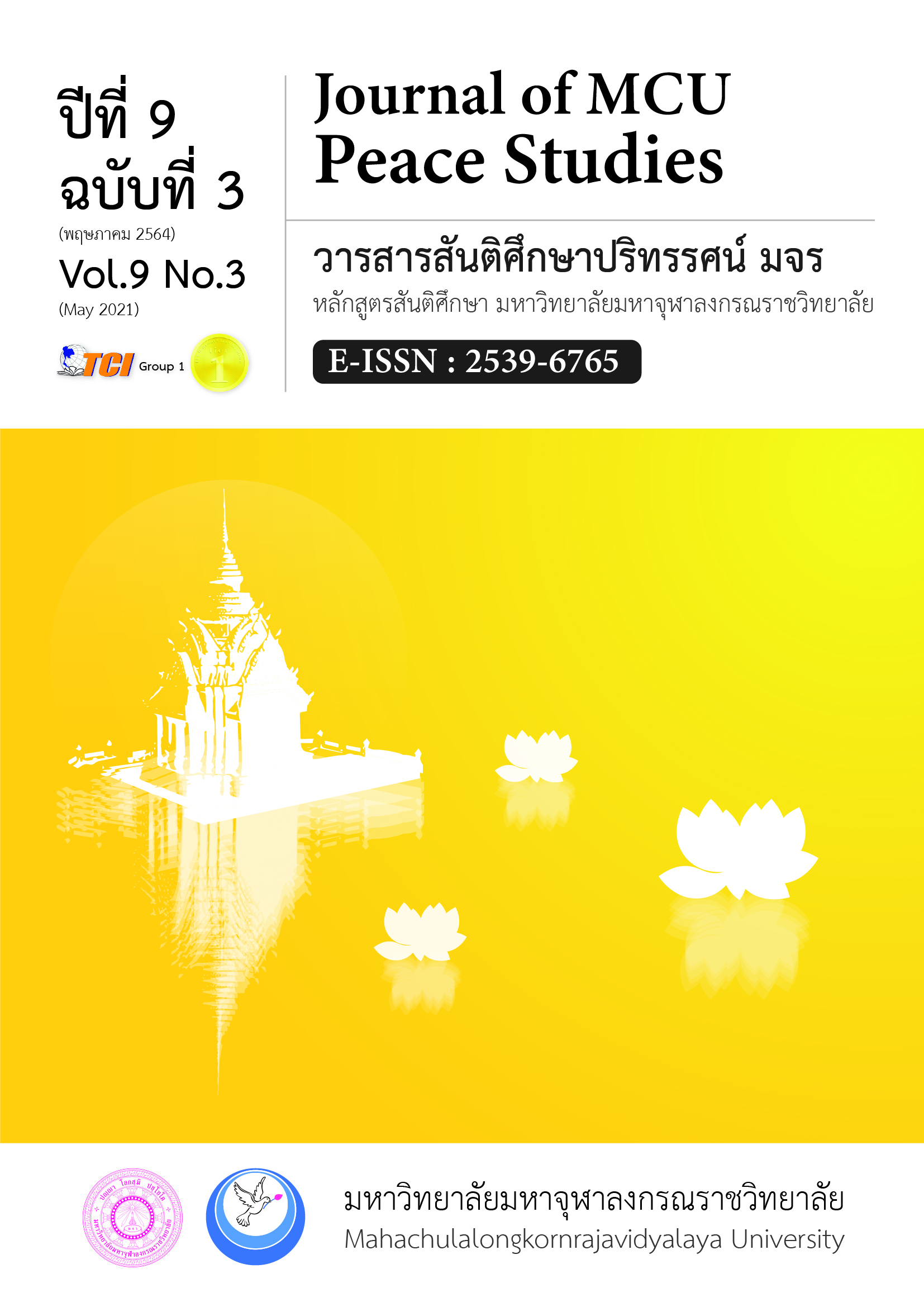เจตคติต่อความเป็นพลเมืองในระบอบประชาธิปไตย ของนักศึกษาสถาบันเทคโนโลยีปทุมวัน
Main Article Content
บทคัดย่อ
บทความวิจัยนี้มีวัตถุประสงค์ 1) เพื่อสำรวจระดับเจตคติต่อความเป็นพลเมืองในระบอบประชาธิปไตยของนักศึกษาสถาบันเทคโนโลยีปทุมวัน และ 2) เพื่อศึกษาปัจจัยที่มีอิทธิพลต่อเจตคติต่อความเป็นพลเมืองในระบอบประชาธิปไตยของนักศึกษาสถาบันเทคโนโลยีปทุมวัน กลุ่มตัวอย่าง คือ นักศึกษาระดับปริญญาตรี จำนวน 161 คนที่ลงทะเบียนเรียนในภาคการศึกษาที่ 2/2563 ซึ่งใช้วิธีการเลือกตัวอย่างแบบแบ่งชั้นตามสัดส่วนของคณะ เครื่องมือที่ใช้ในการวิจัย คือ แบบสอบถาม และวิเคราะห์ข้อมูลด้วยสถิติเชิงพรรณนา และการวิเคราะห์การถดถอยพหุด้วยวิธี Stepwise ผลการวิจัยพบว่า 1) นักศึกษามีระดับเจตคติต่อความเป็นพลเมืองในระบอบประชาธิปไตยในภาพรวมที่ระดับค่อนข้างสูง (Mean= 4.30, S.D.= .55) เมื่อพิจารณาเป็นรายด้านพบว่า ด้านที่มีระดับเจตคติสูงสุด คือ ด้านความเคารพสิทธิผู้อื่น (Mean= 4.36, S.D.= .57) รองลงมา คือ ด้านความเคารพกติกา และด้านความรับผิดชอบต่อสังคม (Mean= 4.30, S.D.= .63 และ Mean= 4.24, S.D.= .63 ตามลำดับ) และ 2) ปัจจัยที่มีอิทธิพลต่อเจตคติต่อความเป็นพลเมืองในระบอบประชาธิปไตยของนักศึกษาอย่างมีนัยสำคัญทางสถิติที่ระดับ .05 ได้แก่ การขัดเกลาทางสังคมจากสื่อสังคมออนไลน์ การอบรมเลี้ยงดูแบบประชาธิปไตย การขัดเกลาทางสังคมจากกลุ่มเพื่อน และผลการเรียน โดยทั้ง 4 ตัวแปรสามารถร่วมกันทำนายเจตคติต่อความเป็นพลเมืองในระบอบประชาธิปไตยของนักศึกษาได้ร้อยละ 61.6 (R2 = .616, F = 62.434, p-value < .05) จากข้อค้นพบดังกล่าวนี้จึงควรมุ่งพัฒนาเจตคติของนักศึกษาในด้านความรับผิดชอบต่อสังคมเป็นอันดับแรก และนักศึกษาควรได้รับการขัดเกลาทางสังคมอย่างถูกต้องและเหมาะสมจากสื่อสังคมออนไลน์ ครอบครัว กลุ่มเพื่อน และสถาบันการศึกษา
Article Details
ทัศนะและความคิดเห็นที่ปรากฏในบทความในวารสาร ถือเป็นความรับผิดชอบของผู้เขียนบทความนั้น และไม่ถือเป็นทัศนะและความรับผิดชอบของกองบรรณาธิการ ยินยอมว่าบทความเป็นลิขสิทธิ์ของวารสาร
เอกสารอ้างอิง
Billig, S. H. (2017). Service and Service-Learning in International Baccalaureate High Schools: An International Comparison of Outcomes and Moderators. International Journal of Research on Service-Learning and Community Engagement, 5(1), 57-83.
Blasko, Z., Dinis da Costa, P., & Vera-Toscano, E. (2018). Civic Attitudes and Behavioural Intentions among 14-Year-Olds. How Can Education Make a Difference towards a More Democratic and Cohesive Europe? Luxembourg: Publications Office of the European Union.
Chansilp, V. (2018). Thai Youth’s Citizenship. Kasetsart University Political Science Review Journal, 5(1), 187-209.
Chanthawan, N. (2016). Democratic Citizenship: A Case Study of Undergraduates at the Main Campus of Ramkhamhaeng University. Academic Journal Phranakhon Rajabhat University, 7(1), 103-113.
Council of Europe. (2016). Competences for Democratic Culture: Living Together as Equals in Culturally Diverse Democratic Societies. Strasbourg: Council of Europe Publishing.
Faul, F., Erdfelder, E., Buchner, A., & Lang, A. G. (2009). Statistical Power Analyses Using G*Power 3.1: Tests for Correlation and Regression Analyses. Behavior Research Methods, 41(4), 1149-1160.
Kamwachirapitak, R., & Yahakorn, S. (2017). Unit 6 Beliefs, Attitudes, and Human Behaviors. in Human Behavior. Nonthaburi: Sukhothai Thammathirat Open University Press.
Khong, K. L. (2010). Students’ Perceptions and Attitudes towards Citizenship: Identity, Social Cohesion and Responsibility as Citizens. (Master’s Thesis). Nanyang Technological University. Singapore.
Klaykaew, K. K. (2016). The Influences of Socialization and Psychological Characteristics on Good Democratic Citizenship Behavior of Bachelor Degree Students. Journal of Behavioral Science for Development, 8(2), 209-231.
Laothamatas, A., & Rattanaset, W. (2014). Civic Public Administration. Bangkok: Dhurakij Pundit University Press.
Laothamatas, A. (2011). Civic Politics. Bangkok: King Prajadhipok's Institute.
Laothamatas, A. (2013). Civicness and Self-Government. Bangkok: Kobfai Publishing/ Foundation for Democracy and Development Studies.
Leech, N. L., Barrett, K. C., & Morgan, G. A. (2005). SPSS for Intermediate Statistics: Use and Interpretation. New Jersey: Lawrence Erlbaum Associates, Inc.
Lupton, D. (2012). Digital Sociology: An Introduction. Sydney: University of Sydney.
Nimpanich, J., & Veeraburinon, C. (2017). Unit 8 Socialization. in Human Behavior. Nonthaburi: Sukhothai Thammathirat Open University Press.
Office of the Education Council. (2011). Development Strategies of Civic Education 2010-2018. Bangkok: Office of the Education Council, Ministry of Education.
Paiboonthitipornchai, P. (2010). The Study of Good Citizenship of Students of Bang Bua Thong Commercial School, Nonthaburi. (Master’s Thesis). Silpakorn University. Phetchaburi.
Pharcharuen, W. (2018). Characteristics of Good Citizenship in a Democratic Society of Students in Maejo University. MBU Education Journal: Faculty of Education Mahamakut Buddhist University, 6(1), 148-161.
Piyakulchaidej, V. (2019). Unit 2 Democratic Citizenship. in Democracy and Democracy Development Process. Nonthaburi: Sukhothai Thammathirat Open University Press.
Portney, K. E., Eichenberg, R. C., & Niemi, R. G. (2009). Gender Differences in Political and Civic Engagement among Young People. Retrieved March 2, 2020, from https://papers.ssrn.com/sol3/papers.cfm?abstract_id=1451262
Pravalpruk, K., & Wichitwanna, S. (2019). Unit 10 Construction and Validation of Affective Domain Test. in Statistics Research and Evaluation in Education. Nonthaburi: Sukhothai Thammathirat Open University Press.
Prescott, C., & Kittichonvorakun, S. (2012). News and Information Exposure and Media Influences on Undergraduate Communication Arts Students’ Political Perception, Songkhla Province. Songkhla: Hatyai University.
Promthong, T., & Trakarnsirinont, W. (2017). The Study of Citizenship: Case Study of People in Umong Subdistrict, Mueang District, Lumphun Province. Political Science and Public Administration Journal, 8(2), 103-127.
Ritzer, G. (2007). The Blackwell Encyclopedia of Sociology. Malden, Massachusetts: Blackwell Publishing.
Srisa-ard, B. (2013). Introduction to Research. Bangkok: Suweeriyasan.
Srisatidnarakul, B. (2020). Effect Size, Power Analysis, and Sample Size Calculation Using G*Power Program. Bangkok: Chulalongkorn University Press.
Tantisoonthorn, T. (2014). Citizenship, Human Rights and Democracy. Bangkok: Institute of Public Policy Studies.
Thammisakul, T. (2013). Factors Affecting Public Mind Behavior of Vocational Certificate Students at Attawit Commercial Technology College (Research Report). Bangkok: Attawit Commercial Technology College.
Thewanaruemitkul, P. (2012). Civic Education. Bangkok: Nanmeebooks Publications.
Thongyoo, D. (2016). Unit 7: Social Psychology. in Psychology for Living. Nonthaburi: Sukhothai Thammathirat Open University Press.
Traimongkolkul, P., & Chatraphorn, S. (2012). Research Design. Bangkok: Kasetsart University Press.
Viphatphumiprathes, T. (2013). Democratic Citizenship of Dhurakij Pundit University Students (Research Report). Bangkok: Dhurakij Pundit University.
Viphatphumiprathes, T. (2014). Factors Influencing Citizenship among Private University Students. Saint John's Journal, 17(20), 86-98.
Viphatphumiprathes, T. (2015). Research Ethics in Social Sciences. Journal of Humanities and Social Sciences Mahasarakham University, 34(6), 52-59.
Viphatphumiprathes, T. (2017). Instructional Guidelines on Civic Education in Thai Higher Education. Journal of Education Prince of Songkla University, 28(3), 13-23.
Viphatphumiprathes, T. (2019). Digital Sociology: Concept and Application. Rajabhat Suratthani Journal, 6(1), 43-55.
Viphatphumiprathes, T. (2020). Ethical Issues in Qualitative Research. Interdisciplinary Sripatum Chonburi Journal, 6(1), 1-11.
Wiratchai, N. (2012). Sample Size for Hypothesis Testing. Retrieved March 2, 2020, from https://lllskill.com/web/files/GPower.pdf


